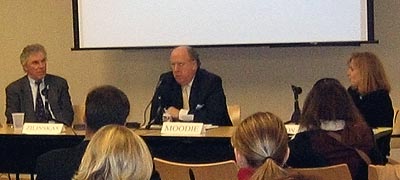December 6, 2006

Synthetic biology is a new bioengineering discipline that aims to apply the burgeoning knowledge of genomics and cellular physiology for practical purposes. Among its goals is the design and assembly of artificial microorganisms that can produce pharmaceuticals, detect toxic chemicals, break down pollutants, repair defective genes, destroy cancer cells, and generate hydrogen for the post-petroleum economy. As has been the case with other powerful new technologies, however, synthetic biology may create new risks for society, including unintended harmful consequences for human health or the environment and deliberate misuse for warfare or terrorism.
On December 6, 2006, the Center for Nonproliferation Studies hosted a luncheon briefing on synthetic biology at its Washington, DC, offices featuring Dr. Raymond Zilinskas, who directs the CBW Nonproliferation Program at the Monterey Institute Center for Nonproliferation Studies. Amy E. Smithson, a Senior Fellow at the Center for Strategic and International Studies, offered feedback and commentary. The program was moderated by Michael Moodie. The focus of the briefing was to assess the current status of research in the field; examine the risks of this new technology for public health, the environment, and national security; and suggest some policy options for regulating it.
